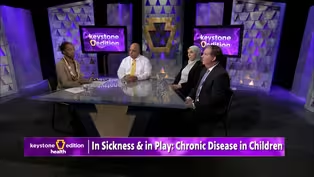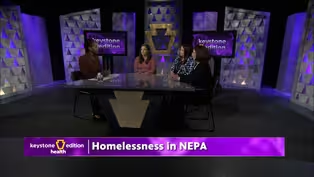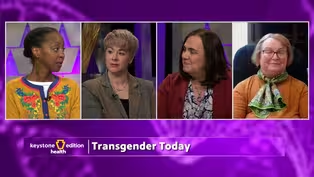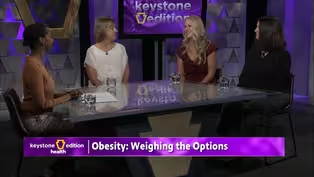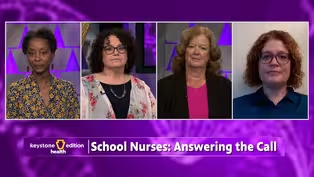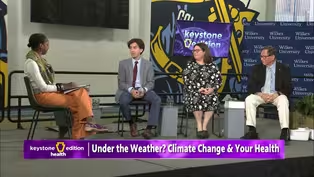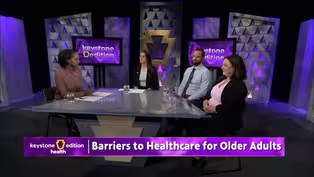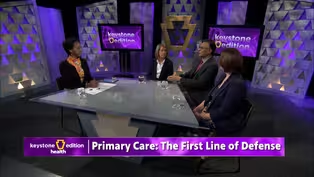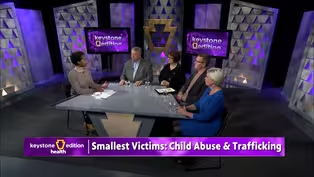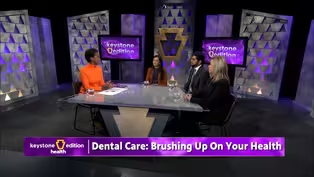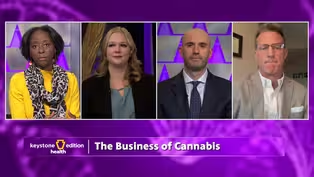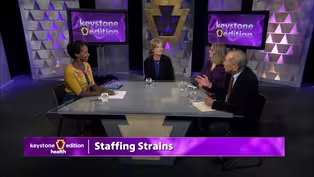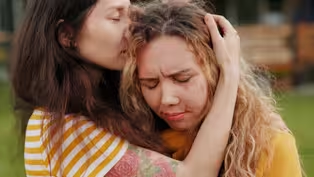Keystone Edition
Domestic Violence: Breaking the Silence
2/19/2024 | 26m 59sVideo has Closed Captions
Access to the right resources can make facing this challenge a little easier for families
Domestic abuse can be defined as a pattern of behavior in any relationship that is used to gain or maintain power and control over an intimate partner. Abuse can affect the young, the elderly, male and female in the form of physical, sexual, emotional, economic or psychological actions or threats of actions that influence another person. Find out more about these resources in your community.
Problems playing video? | Closed Captioning Feedback
Problems playing video? | Closed Captioning Feedback
Keystone Edition is a local public television program presented by WVIA
Keystone Edition
Domestic Violence: Breaking the Silence
2/19/2024 | 26m 59sVideo has Closed Captions
Domestic abuse can be defined as a pattern of behavior in any relationship that is used to gain or maintain power and control over an intimate partner. Abuse can affect the young, the elderly, male and female in the form of physical, sexual, emotional, economic or psychological actions or threats of actions that influence another person. Find out more about these resources in your community.
Problems playing video? | Closed Captioning Feedback
How to Watch Keystone Edition
Keystone Edition is available to stream on pbs.org and the free PBS App, available on iPhone, Apple TV, Android TV, Android smartphones, Amazon Fire TV, Amazon Fire Tablet, Roku, Samsung Smart TV, and Vizio.
Providing Support for PBS.org
Learn Moreabout PBS online sponsorshipMore from This Collection
Healthcare is constantly changing as technology finds new and better ways to help people live longer, healthier lives. Host Tonyehn Verkitus will address the issues that are important to the people in our community, including the ongoing pandemic, concerns about vaccines, food deserts, childhood trauma and child abuse, mental health, environmental issues, and the rising cost of staying healthy wit
In Sickness and in Play: Chronic Disease in Children
Video has Closed Captions
About 25% of children in the US aged 2 to 8 years have a chronic health condition (27m)
Video has Closed Captions
Homelessness can happen to anyone at any age or socio-economic status. (26m 59s)
Video has Closed Captions
As we raise the visibility on Transgender young adults and embrace them within our culture (26m 59s)
Video has Closed Captions
Obesity is a serious risk factor many try to avoid when developing healthy eating habits. (27m)
School Nurses: Answering the Call
Video has Closed Captions
What can our school districts do to help retain and recruit nurses for future generations? (27m)
Under the Weather? Climate Change & Your Health
Video has Closed Captions
How does climate change impact individual and public health? (54m 59s)
Barriers to Healthcare of Older Adults
Video has Closed Captions
What progress have local organizations made in addressing these challenges? (27m)
Primary Care: The First Line of Defense
Video has Closed Captions
When was the last time you saw your primary care doctor? (27m)
The Smallest Victims: Child Abuse & Trafficking
Video has Closed Captions
What are the signs to know to spot child abuse and even possible trafficking? (27m)
Dental Care: Brushing Up on Your Health
Video has Closed Captions
How can providers make dental care more affordable and accessible? (26m 59s)
Video has Closed Captions
What does the cannabis industry mean for Northeastern and Central Pennsylvania? (26m 59s)
Video has Closed Captions
Low staffing levels can lead to burnout among healthcare workers (27m)
Providing Support for PBS.org
Learn Moreabout PBS online sponsorship- [Announcer] Live from your Public Media Studios, WVIA presents "Keystone Edition Health."
A public affairs program that goes beyond the headlines to address issues in Northeastern and central Pennsylvania.
This is "Keystone Edition Health."
And now, moderator, Tenyehn Verkitus.
- Good evening, and welcome to "Keystone Edition Health."
I'm Tenyehn Verkitus, thank you for joining us tonight.
Behind closed doors, domestic violence manifests in various forms.
From physical assaults, leaving visible scars, to psychological manipulation, leaving invisible wounds.
Victims often trapped in a cycle of fear and dependency endure unimaginable suffering at the hands of those meant to provide love and protection.
Domestic violence, a pervasive and insidious issue, silently erodes the sanctity of homes worldwide.
But first, WVIA's Sarah Scinto has more.
(logo swoosh) - [Sarah] Domestic violence appears in several forms.
Physical, emotional, psychological and financial abuse all create a climate of fear, manipulation, and control within intimate relationships.
In 2022, the Emergency Assistance Foundation reported an average of 24 people per minute are victims of rape, physical violence, or stalking by an intimate partner in the US, totaling over 12 million men and women annually.
Despite increased awareness and advocacy, domestic violence continues to pose a significant threat to the wellbeing and safety of countless people worldwide.
Its imperative to understand its underlying dynamics, impact, and the crucial steps needed to support survivors and prevent further harm.
For "Keystone Edition Health," I'm Sarah Scinto, WVIA News.
(somber music) - Joining us tonight, we have Lauren Peterson, executive director of Safe Monroe.
Richard Wojciechowsky, executive Director of Schuykill Hope Center for Victims of Domestic Violence.
And Sabrina Hannon, medical advocacy program coordinator at the Women's Resource Center.
Thank you all for joining us.
- Thanks for the afternoon.
- Yeah, absolutely.
So Lauren, why don't we kick it off with you?
Can you tell us a little bit about your services?
- Sure, great, so thank you so much for having me tonight.
Safe Monroe is the domestic and sexual violence center for Monroe County, located in the Pocono Mountains.
And we've been providing free and confidential services to anyone impacted by domestic or sexual abuse for over 43 years.
All of our services are completely free and confidential.
We have a 24 hour hotline, we have support groups, individual counseling, an emergency shelter, legal advocacy and accompaniment through the court system, as well as a prevention education programs in the schools and in the community.
- Now, I know all of you offer some sort of shelter program, but I would love if each of you can share a little bit about how the shelter program works.
I think it's really important for folks to understand who can access shelters, because as I spoke about with each of you, men also are suffering from domestic abuse.
So I'll turn it over to you, Rick.
- Sure, so I'm with Schuylkill Hope Center for Victims of Domestic Violence, and it is the advocacy center in Schuylkill County, formerly known as Schuylkill Women in Crisis.
And one of the reasons for the name change was to absolutely let everyone know about the inclusivity of the program, as you mentioned.
Our emergency shelter runs 24/7.
We have a 24/7 hotline, where we cooperate with law enforcement, victims, relatives, anyone that reaches out to us for help at any time.
So we do provide onsite safety sheltering for all victims, family members.
We also have an onsite pet shelter now.
So the hurdle of leaving home and leaving a pet behind is eliminated, at least for our victims in Schuylkill County.
We utilize hoteling as well, as I think most agencies do.
If the shelter is just over packed to the point that we can't fit one more bed in anymore, we will utilize safe county hoteling areas to put people in a safe environment for as long as needed.
- You just mentioned that the 24 hour hotline is for relatives as well, and I had not really thought about this, but are there sometimes relatives calling as opposed to the victim themselves?
- Absolutely, people will reach out for help.
And they may be reaching out for knowledge on how to help, or how to broach the subject, or whom to call at that moment.
And all of us have the 24/7 hotline so we can give that information whenever it's needed.
- Okay, and are the hotlines tied into 211 too, because we were talking about that last episode.
- So 211 is a national hotline, right, we can go through there.
We each have our own regional hotline, which will get you immediately to a person, live person, who you're talking to as soon as they pick up the phone.
And it works just a little bit quicker to get the right agencies and the right help, people to the scene or on the scene to help with an emergency situation.
So I think the 211 absolutely wonderful, but if you are in an area that you're lucky enough to have a regional hotline, it would be my opinion, I think, to use that much more frequently to get the help you need.
- Okay, and Sabrina, what about your shelter?
How many folks can you hold and how easy is it to access?
- So basically, much like our friends here, our shelter works very similarly.
You would call our 24 hour hotline in order to access the shelter.
And that's for anyone who is experiencing domestic violence, sexual assault, human trafficking, stalking, dating violence.
Doesn't matter your gender, your sexuality, et cetera.
We're also, it's free and confidential.
There's no economic status that you have to have in order to access our services.
- [Tenyehn] Okay.
- So someone who's not safe at home can call, and they'll work with our crisis hotline workers to determine if staying in our shelter is the best option for them.
Perhaps they're not from this area, maybe they have friends in Ohio or family in Ohio that they can stay with and they'll be safe there, we'll help get them to Ohio as well.
We're always looking for permanent solutions 'cause shelters are for short stays.
So we wanna make sure that someone who's experiencing abuse has a safe place to go and has a safe place to be long term.
And certainly people can call who also are not in crisis, who maybe are experiencing flashbacks to something that happened years ago and they just need someone to talk to.
I think a lot of times people hear about the 24 hour hotlines and they think, "Well ,it's only if I'm in crisis, it's only if I need to go to shelter."
And that's very important, and that's certainly what we're there for, but also for folks who aren't in crisis, but need help in other ways.
- That's the one call that can get you what you need.
- Absolutely.
- Yeah, exactly.
- And there's really a big cooperative effort between shelters.
That should be known too.
If we were fully booked and just could not find access, we could very easily call a neighboring shelter and they would step up and help.
Or if someone needs to be moved, maybe for safety reasons, from one county to another, the intertwining of the agencies makes it even stronger.
- [Sabrina] Yes.
- Absolutely.
We've had a lot of coordination at the state level and working even in our regions with understanding these kinds of terms of warm handoffs and working between our advocates to get people to where they need to go, to get them to safety.
And just like he said, is if we're full, we can work with our other shelters in the area to maybe access an area that they can get some help.
- And how are we dealing with younger victims, right?
So if you have someone who's an adolescent or a teen calling, they're a minor, what happens in a situation like that?
- Right, so when someone calls the hotline, they can remain completely anonymous.
They don't have to give us any information, they don't even have to tell us their real name.
Let's say if someone is just reaching out, asking for information about what services maybe we do provide.
Or as she said, if someone is in crisis and just needs to speak to someone, they don't have to give us any information.
But for people who are minors, our services are available for them too.
If they wanted to talk about counseling, if they wanted to kind of talk about just any kind of crisis situation that they need to speak to, we don't discriminate due to age.
We really work off of a mental health kind of a feel.
With regards to age, if someone is 14 years or older, they're able to consent for mental health services on their own in the state of Pennsylvania.
So we utilize that as kind of like our baseline.
People who are younger than that, if they do want ongoing services, we would need to work with a non-offending caregiver, whoever that might be, just at least one.
Sometimes if we're dealing with custody issues or things like that.
So we just need at least one non-offending caregiver to step up and to allow that release of information.
- [Tenyehn] Okay.
- February is Teen Dating Violence Awareness month, so you were right with bringing that up.
But the name is kind of changing now with the coalitions.
It's Adolescent Relationship Abuse.
And again, that's more inclusive.
Folks a little bit before the teen years and a little bit after, between 11 and 21.
We want everyone to be aware of the things that were out there educating and prevention methods as well.
- Well, you brought up February being teen month, but it's also Valentine's Day.
Do you find that holidays exacerbate issues, or do you get more calls?
- I don't know about Valentine's Day, but holidays in general.
The stressors that impact us all obviously magnify problem areas as well.
And I think we do see an influx in volume of calls and needs for assistance.
Which to us is great because they're reaching out to us and we can give them the assistance.
But it shows that the need is still there.
- Absolutely, yeah, not just Valentine's, but any kind of holiday.
Domestic and sexual violence happen every single day out of every hour of the day.
- [Tenyehn] Right.
- And sometimes around holidays, even in relationships that don't include domestic violence, people's stressors are up, the anxiety is a little higher, finances are maybe a little tight.
And these aren't experiences that are just happening to anybody, but there are reasons that it can actually exacerbate a situation.
If there is maybe red flags or a certain domestic violence, domestic abuse situation happening, it can really elevate the violence and the risk factors can be a little higher for someone who's experiencing abuse.
- Yeah, can we talk a little bit about warning signs?
Actually, Sabrina, would you be able to tell us what signs we could look for in a friend or family?
- Yeah, so I think one of the big red flags that I always look out for are things like jealousy, controlling behaviors.
It's something that unfortunately for a while has been romanticized in pop culture, but it's actually a sign of something far more sinister going on.
So you're also looking at someone who, maybe is making comments about how you're dressing, or about friends and they don't want you to hang around them.
There's something that we have, and you can find on the internet, it's a power and control wheel.
Highly recommend it.
They have ones for teens as well.
And I mean, it's a lot of the same things, but it gets more specific, and about things that to look out for that might show that your relationship is not exactly healthy.
And that goes for all relationships.
There's also a healthy relationship wheel.
So if you're not quite sure if you're falling into that one, look at the healthy relationship one and maybe you can be like, "Oh yeah, it's not quite meeting that."
So yeah, I would say things like jealousy, someone who is tearing you down.
'Cause domestic violence, you hear violence and you think physical abuse, but that's not the most common form of domestic violence.
It's financial abuse, that's what we see most commonly.
So also someone who is always trying to control your finances or take money from you in one way or another is something also to look out for.
- Yeah, I was hoping we could talk about that a little bit, right, because I think most people are thinking bruises or injuries are the signs that you should be looking for, but there's other ways that people can control, manipulate, and play psychological games.
So what are some of those other things?
You just mentioned finances, but are there other things that you see pretty commonly besides the jealousy?
- Yeah, so finances is actually one of the ones, we've been seeing a little bit of an uptick right now with people who are reaching out due to financial abuse.
And that's not necessarily just taking money from somebody, that could mean opening a credit card, or getting some kind of a loan in somebody else's name and then they ruin that person's credit, or maybe not allowing that person to work outside of the home, or don't allow them to control their own finances or things like that.
So that kind of financial abuse is really, we're seeing it in Monroe a little bit more than we have in the past.
Some other ones that maybe are a little not as normal is reproductive coercion.
And we were talking about this earlier before the segment, is controlling a birthing person's way of to reproduce, whether it's forcing them to terminate a pregnancy, forcing them to continue a pregnancy.
Stealthing is another one that we see that is used in more of the younger crowd, where it's in the midst of a sexual ingress that it's happening and you either remove a condom or purposely puncture holes to make it unusable.
So it really is something that we're seeing more often in the younger crowds.
But reproductive coercion is one that really flies under the radar, that people don't hear a lot about.
- [Tenyehn] Wow, okay.
- Emotional abuse, I would add to that, which usually manifests itself very early, right?
It's a form of control, but putting the person down, putting your partner down, constant negative quotes and suggestions so that, trying to make that person feel like you're the only one, you the offender is the only one there for them.
That's a warning sign that family members can pick up on.
Most abusers try to present two people, the one to the partner, which is their true self, and the fake person to the rest.
But little things do come up in body language and words chosen, and reactions, even facial expressions, and those are things we can look for as well.
- And then how are we helping people recover?
I mean, we've talked about counseling and therapy, but what does that process look like?
- It depends on what that individual needs.
Everyone's experiences, while they have common themes woven throughout them, they're their own unique situation and story.
So we work with them on finding what works best for them.
You might have someone who has some addiction issues and they decide that they would like to get help with that, so we will help with those services, put them in contact with services that work best for them.
You might have someone who has had their finances destroyed, so we're gonna be working with them then on rebuilding that credit, learning financial literacy, things like that.
It's very much so needs based, on what they need.
Learning about reproductive health, things like that.
One of the things we do are, for the people in our housing program, we have dinner meetings.
We have a dentist who's gonna be coming in to talk with them about dental health, same thing with reproductive health.
So it's really based on whatever it is that they may need.
- That was just a great answer, really great.
Because the victim who has lost control and they're being courageous enough to leave that situation now gets full control when they come to one of our agencies.
They direct their recovery, they direct what services they need, they make their own decisions.
We advocate and help and give them options, but they are in control.
And that's what we're trying to do, give that back to them.
- Right, it really comes down to this thing called empowerment.
And our centers really work off of this philosophy and it's core to our work.
And just as he said, when someone is in a domestic or sexual violence situation, power has been taken away, control has been taken away, their ability to make decisions.
And even as something as simple as when we're meeting with somebody, "Would you like to sit down or can I sit down with you?"
Instead of handing someone a tissue if they're crying, "Would you like a tissue?"
Allowing them to make little steps, little decisions allows them to build back up that confidence in themselves that they can do this.
And our advocates are here to help them along the way.
- Yeah, I would imagine it's hard to take those first steps.
I recently, actually interviewed a storyteller who had a story of domestic abuse, and she turned it into art and actually started creating performance pieces.
And that's what helped her heal, which I thought was very interesting.
- Yeah, there's no shame at all in admitting you're in a bad situation and you are a victim.
It's absolutely courageous to take the step, that first step of reaching out to one of our agencies, moving to a shelter.
Imagine just leaving everything that is at least known, even though it's a negative, a known home, a known source of income, and being courageous enough to say that, "I deserve better and I'm gonna go out and get it."
- Recently, WVIA'S Tim Novotney met with Kimberly Portanova-Feibus, clinical director for Marley's Mission.
Marley's Mission is an organization which uses equity and assisted psychotherapy to assist children and young adults dealing with trauma and depression.
(logo swoosh) (bright music) - There's just something so magical about being with them.
And maybe it was my own therapy at the time that I didn't even recognize.
My name is Kimberly Portanova-Feibus.
I'm a licensed professional counselor, and I started with Marley's in July of 2011, so about 12 and a half years.
(bright music) Say hi.
You have goopy eye, I know.
I grew up loving animals.
When I was a child, wanted to be a veterinarian.
Bugged my mom until about at the age of seven, she finally gave in and let me start taking horseback riding lessons.
So horses have been a part of my life for 50 plus years.
Come on, come out, come on.
(blows kiss) (bright music) Come on.
I saw a billboard for Marley's mission after I was finishing up my graduate work.
And at the end of the graduate work, it requires field work.
So I got home, and I went on the internet, and I googled Marley's Mission, and they said, "We have summer camp starting on Monday, come on up."
And the rest is history, I've been part of it ever since.
Marley's was created by one woman, April Kemp.
(bright music) And in July of 2009, someone had broken into their home and attacked her child.
Following that, April saw that her child was not, she was five.
Traditional talk therapy, a five-year-old doesn't have the words, doesn't have the cognitive ability to put together to talk about what happened, and she was just very shut down.
And the community had gathered funds, and with some of that money, April got a horse.
And she describes it as seeing her daughter smile for the first time when she was with this horse.
And she said, "We need to do this for all children who have experienced something horrific."
And so Marley's mission was started.
(bright music) Horse therapy is, we are very much like traditional therapy, in that there's scientific evidence that proves what we do is effective.
What's different about it is, sometimes an office is just too clinical of a setting.
It's really hard to let down your defenses and to be your authentic self.
So horses can naturally break down someone's defense mechanisms by just building that emotional connection, and suddenly the client feels more comfortable and confident to work through whatever internal processes they may not be able to talk about in a different setting.
People talk about what's happening.
And with equine-assisted psychotherapy, often it's not so much what is physically happening, the doing, it's the being.
At Marley's, we want to make this as easily accessible to anyone who needs our services.
So we work with children specifically between the ages of five and 18.
And in order to get in touch with us, if you have a loved one, if you're a teacher and have a student, if you are a pediatrician and are thinking of a particular patient as you're watching this, you can go to our website, which is very simple, marleysmission.com.
You can call us, you can email us, you can fax us, anyone can refer to us.
So sometimes people think that they need to have another clinician or a medical professional referring, but we get referrals from family members, teachers.
Sometimes kids will say to their friend, "I go to Marley's, you should really give them a call.
They could help you too."
(bright music fades) (logo swoosh) - Sabrina, I wanna make sure we talk a little bit about your role as medical advocacy program coordinator.
What does this mean for the folks that you serve?
- So what my job is basically, is I'm working to build a relationship between WRC and the medical community in Lackawanna and Susquehanna Counties.
This is to both help victims who are in the medical system, like we know they're there, they're going to their doctors, and also to help the medical providers who are in the system as well.
Because I mean, you're already having to do so much, and oftentimes with complex trauma, there is so much work that needs to be done in addition, we can help alleviate that.
And so, what I'm trying to do is go into medical settings and work with them, understanding what their patients are going through.
Because someone who's experienced domestic violence, it's more complex than just a bruise or maybe a broken bone.
We're looking at things that can affect someone for the rest of their lives.
Talking to medical providers about ACEs, adverse childhood experiences, and what happens when children are experiencing or exposed to domestic violence as children, what can happen throughout their lifetime then.
One of the other things that I did was I helped create a human trafficking screening tool for all medical settings.
So I am in the process of rolling that out to any medical providers who would like it so that they can correctly identify human trafficking survivors while they're in the system and while they're with them.
And then along with that, along with doing all the education, I also work with victims intervention program.
We partnered together to put on a sexual assault nurse examiner training this past fall.
We do it every other fall.
And that's just training SANE nurses, who if you've been sexually assaulted and go to a hospital, you want a SANE nurse there because they're the ones who are trained on collecting all the evidence and supporting the victim in a trauma-informed way.
- I would think that if someone has experienced trauma, they probably also need legal help.
And I know you do provide this, so can you tell us a little bit about the services?
- Sure, our in-house services civil legal representation is one of the few that are in the state.
I believe there's over 50 domestic violence advocacy programs, and maybe less than 20 that have that program, so we're very fortunate to be a part of that.
And our lawyer and assistant paralegal in that department, they help with proceedings such as PFA extensions, custody issues, divorce issues.
And so instead, again, when the victim has taken that step to start bettering their life and then get the life they deserve, we have resources on hand to help them with all facets of that going forward.
So we also have court advocates that accompany our victims to the court levels at all, to PFAs, like I said, applying for them, extensions, making them permanent, to if they are a victim of a crime, and walking through that daunting process of being in a criminal courtroom going forward.
- Absolutely.
So we do not have a CLR program here at Safe Monroe, but we are lucky to have some excellent court advocates who guide people, as he said, through the court process, whether it's criminal or civil.
In Monroe County, we're lucky that the court actually assigns a attorney to the plaintiffs who are seeking a protection from abuse order so that the victim doesn't have to come in and try to find their own.
But we always have an advocate available to answer their questions because it can be pretty daunting for someone walking into a courtroom, it can be very scary.
And sometimes you hear the term legalese, and sometimes they're talking above people's understanding.
And a court advocate can help people understand what is happening, and be that liaison between attorneys and the victims.
- It would seem that all of your services could probably use a lot of volunteers.
Do you take legal and medical volunteers?
Just in case there's anyone out there who's interested.
- Well, we take any person who wants to help.
- Okay.
- Here at Safe Monroe, we take volunteers who help us out directly on the hotline.
And we provide a training program, that's a 70 hour training program that's required through both of our funders to become a crisis counselor advocate.
And you're able to make a big difference in someone's life just by answering a call.
Just by taking one or two overnight shifts a month, you could be that person who could be that first contact that a victim reaches out to for help.
And that can be life changing for someone.
- I appreciate you all telling us all that you shared tonight.
I wanna thank our guests for their insights, and to all of you for joining us.
For more information on tonight's episode and to see other episodes, go to wvia.org.keystonehealth.
For "Keystone Edition Health," I'm Tenyehn Verkitus.
Have a good evening.
(bright music)
Domestic Violence: Breaking the Silence - Preview
Preview: 2/19/2024 | 30s | Watch Monday, February 19th at 7pm on WVIA TV (30s)
Providing Support for PBS.org
Learn Moreabout PBS online sponsorship
- News and Public Affairs

Top journalists deliver compelling original analysis of the hour's headlines.

- News and Public Affairs

FRONTLINE is investigative journalism that questions, explains and changes our world.












Support for PBS provided by:
Keystone Edition is a local public television program presented by WVIA
